
Our 38 Favorite Books of 2022
The Lit Hub Staff Picks the Best Books of the Year
In the year that was 2022, NASA’s new James Webb Space Telescope peered into deep space. Russia invaded Ukraine. Protests raged across Iran. Elon Musk bought and proceeded to destroy Twitter. We all watched the Johnny Depp/Amber Heard trial and felt gross afterward. Kim Kardashian did Marilyn Monroe cosplay. The Red Wave failed to crest. In a love story for the ages, Ben Affleck turned all those memes around and got himself married to Jennifer Lopez. The UK managed three different prime ministers. Ketanji Brown Jackson was confirmed to the U.S. Supreme Court. We got monkeypox. Even book snobs learned about Colleen Hoover.
Will Smith slapped Chris Rock on stage at the Oscars. Harry Styles was on the cover of Better Homes & Gardens. Everyone, it seemed, had a Dimes Square feature in them. There were over 600 mass shootings in the US, including at Robb Elementary School in Uvalde, Texas, and yet again our government mostly looked the other way, too busy overturning Roe v. Wade. The World Cup kicked off, impossibly, stupidly, in Qatar. Adnan Syed was released after 23 years of wrongful imprisonment. Queen Elizabeth died. Everyone gave up on the pandemic, despite it being not at all actually over. Something something butter boards.
Also, we read a lot of books. Here are some of our favorites.
*
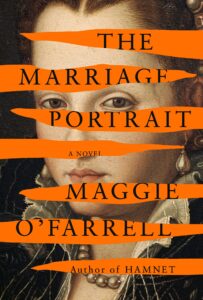
Maggie O’Farrell, The Marriage Portrait
Anyone who read Maggie O’Farrell’s 2020 novel Hamnet knows that her ability to perfectly recreate a historical world is unparalleled. In The Marriage Portrait, the life of the young duchess Lucrezia de Medici is thrown into chaos when her older sister dies on the eve of her wedding, forcing her to become the betrothed. Already the black sheep of her family—as an infant she’s “intractable” and “unbiddable,” sent away from the nursey and wet-nursed by the cook—when she is married off in her sister’s stead, Lucrezia is alone and scared. She is consumed with the pressure to produce an heir and unsure of her volatile and unknowable new husband (plus she’s convinced he’s planning to murder her). As the novel builds towards its inevitable, soon-predictable conclusion, the melodrama reaches a wild fever pitch. It’s overly dramatic, utterly fun and romantic, and a most enjoyable read. –Emily Firetog, Deputy Editor
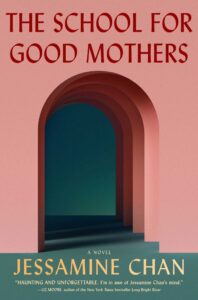
Jessamine Chan, The School for Good Mothers
I’m generally loath to recommend a book that has already been tapped by Barack Obama, because I figure he’s got it covered. In this case, though, I simply must. Jessamine Chan’s debut novel is a dystopian story of one woman’s year at a government-run re-education center for “bad mothers” (loosely defined, frequently tied to economic circumstances, naturally) following an act of desperation-and-exhaustion-born neglect toward her young daughter. At the titular school, Frida Liu must care for a robot daughter with an increasingly alarming level of sentience, while under constant surveillance. When I started reading the novel, my daughter was the exact age as Frida’s, and though at times I found it physically painful to keep turning the pages, it was impossible to tear myself away. The School for Good Mothers is equally effective as a social critique, a terrifying dystopia, and a heartbreaking portrait of motherhood in a (very familiar) society that is inhospitable to the point of horror. –Jessie Gaynor, Senior Editor
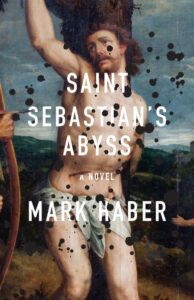
Mark Haber, Saint Sebastian’s Abyss
I wrote about how much I loved Mark Haber’s witty, sharp-edged, and weirdly moving novel earlier this year, and it remains my favorite book of recent memory, obsessed as it is not only with the nature of art and friendship and aging but also the nature of obsession itself, which is always one of the most fruitful of literary topics. The book begins as our narrator is en route to visit his best friend/worst enemy/academic rival Schmidt, who is dying, and who has summoned him for—nine-page email notwithstanding—reasons unknown. It’s funny and wistful and weird, with a unique rhythm that continues to cycle through my brain. Especially recommended for all you writers out there. –Emily Temple, Managing Editor
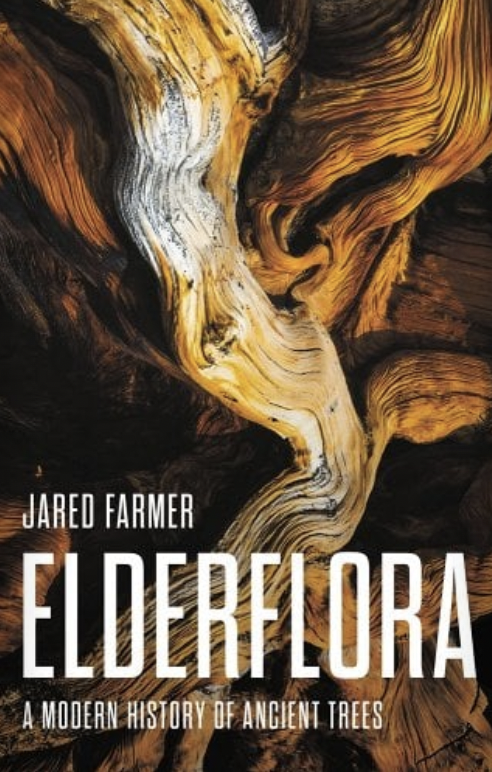
Jared Farmer, Elderflora: A Modern History of Ancient Trees
Jared Farmer’s Elderflora could have been a much simpler book—a series of vignettes about really, really old trees, and why we think they’re cool—and it still would have been wonderful. Luckily for readers, Farmer’s editor was obviously fine giving full rein to his writer’s roving erudition, which takes us from Edo Japan and its ginkgo folk remedies to the bright lights and big hucksterism of Gilded Age New York to the solitary pursuit of the world’s oldest living thing in the high barrens of the Great Basin. Farmer’s notional purpose is to catalog our human obsession with the oldest and tallest trees, but what he has given us in Elderflora is a cross-discipline meditation on the nature of biological time, a deeply grounded work of spiritual ecology that achieves that rare balance between epistemological rigor and quiet grace. –Jonny Diamond, Editor in Chief
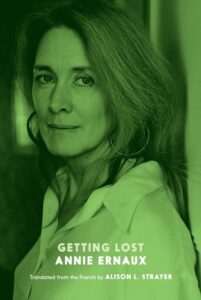
Annie Ernaux, tr. Alison L. Strayer, Getting Lost
Nobel winner Annie Ernaux’s gorgeous, wrenching Getting Lost—the diary she kept of her affair with a younger, married Russian diplomat in 1989—was published in English translation (by Alison L. Strayer for Seven Stories Press) for the first time this year, two decades after it came out in French. A diary of obsessive desire, it is also, as Ernaux writes, “a cry of passion and pain from start to finish.” The affair is documented as precisely, and as honestly, as only Ernaux can: the secret meetings, the shifting modes of power, the vulnerability, the doubt and pain that accompany such wanting. I couldn’t put down this electrifying, absorbing book. –Corinne Segal, Senior Editor
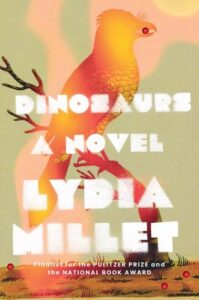
Lydia Millet, Dinosaurs
This book begins when, for personal reasons, a man named Gil decides to leave his life in New York City, to walk to Arizona, and to start again there. I too had a lot of questions from the get-go (What drove him out of New York? Wouldn’t a plane or even a series of Greyhound buses be faster?) but with Lydia Millet, you trust that it’ll be revealed in good time, and you’re just happy to be inside her world once more. In Arizona, Gil becomes fast friends with his neighbors: a family living in a curious glass house. His relationships with each of its members change him, and them, fundamentally. The way Lydia Millet captures the organic growth of these bonds is masterful. And then there’s the matter of the birds. Gil is a careful observer of his environment and is distraught to find a hawk laying dead on the lawn, full of bird shot. He makes it his mission to find out who’s killing the local wildlife. It wouldn’t be a Lydia Millet novel without some mention of the ripple effect we have on the natural world.
I once heard Lydia Millet say she doesn’t like the term “climate fiction” because the books that tend to fall into this category are not fictions: they are our shared reality. While this novel isn’t as explicitly about climate disaster as her last book, A Children’s Bible (also 10/10 recommend), the threat of our interference looms. More than anything, Dinosaurs is a beautiful reminder of our interconnectivity and a question about how we can be good to ourselves and to each other. –Katie Yee, Associate Editor
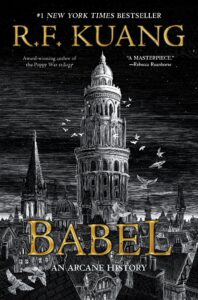
R.F. Kuang, Babel
R. F. Kuang’s historical fantasy novel Babel: An Arcane History of the Oxford Translator’s Rebellion is nothing short of brilliant. Set in the 1830s and 40s, Babel follows Robin Swift, orphaned by cholera in Canton and taken to Britain to be raised by a strict taskmaster. His education is focused on learning to be fluent in as many languages as possible, so as to excel at this fantasy world’s greatest source of magic: manipulating the gaps in meaning between seemingly direct translations in order to manipulate the world surrounding. When Robin arrives at Oxford in order to continue his training, he makes fast friends with his cohort of fellow linguists and retreats from worldly concerns into the safety of the Ivory Tower, even as he and his friends face racist, sexist, and classist attacks from fellow students, but eventually the rapidly changing world around them will leave these scholars no choice but to confront the realities of exploitation enabled by the magic they create. The industrial revolution is booming, the Opium Wars are coming, inequality is growing, and the Oxford-based translators, with their silver bars engraved with conquered tongues in translation, are ready to revolt. –Molly Odintz, CrimeReads Senior Editor
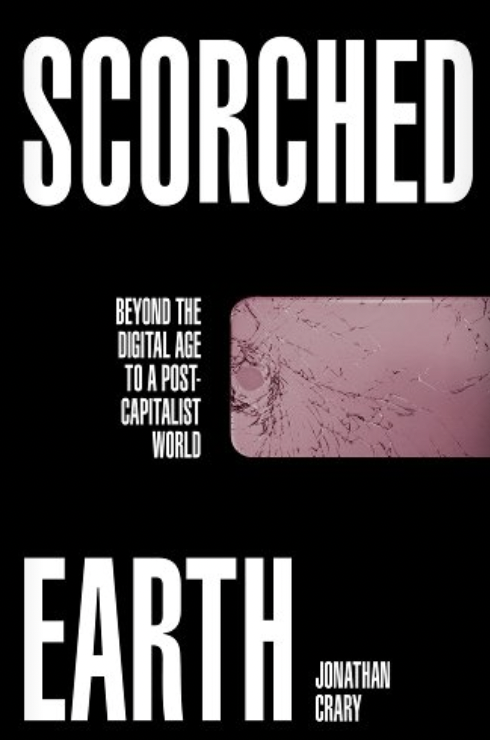
Jonathan Crary, Scorched Earth: Beyond the Digital Age to a Post-Capitalist World
I read Scorched Earth, Jonathan Crary’s post-digital, post-capitalist manifesto (my word, not his), before noted tunnel-borer and Reddit-user Elon Musk bought Twitter in a fit of wounded oligarchical pride—and boy does Crary’s thesis look even truer now. At great risk of oversimplification, Crary doesn’t think we can separate our digital lives from our participation in late-stage capitalism; whatever early utopian internet dreams existed for digital technology as a democratizing tool have long since yielded to the nightmarish realities of surveillance capitalism. And for Crary, it is naive to think we can dismantle dehumanizing digital systems from within: to escape the effects of late-stage capitalism, we have to escape the internet. (Yes, I know you’re reading this on a website… ?) –JD
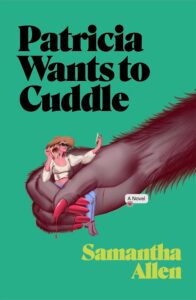
Samantha Allen, Patricia Wants to Cuddle
My most widely recommended book this year is Samantha Allen’s lesbian sasquatch novel, which might sound like a niche pick, but it’s just so enjoyable, and who doesn’t like to enjoy things? (Cynics and snobs aside.) Set on the fictional Otter Island in the Pacific Northwest, Patricia unfolds across varying viewpoints: from the four contestants on a Bachelor-style reality TV series, the ruthless producer who knows what it takes to put on a show, a woman searching for her sister who disappeared years earlier on Otter Island, and the locals who have appointed themselves Patricia’s keepers. It’s a story that loves outcasts, that recognizes the overlaps between horror movies and dating shows, and that doesn’t mind being a little “bonkers”—all from one of my favorite writers working today. –Eliza Smith, Special Projects Editor
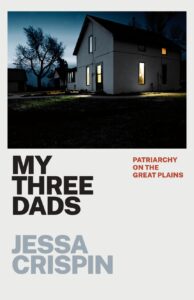
Jessa Crispin, My Three Dads
Jessa Crispin has made a name for herself as a formidable literary critic: she does not bend to the whims of the publicity machine, she has not and will not say a book meets her standards if it does not. I find her approach refreshing, to say the least, relieved to know somebody is out there saying the full truth of their opinion, no matter if the mass consensus is the polar opposite. Her reviews being the only window I had into Crispin’s person, I wasn’t sure what a book-length nonfiction project of hers would be like. Any subconscious trepidation I may have had, fears of unimpeded negativity, or simply the book not being good enough for a critic of Crispin’s stature, quickly went out the window.
What I was overjoyed to find in My Three Dads was, of course, a critique of American culture from every angle (patriarchy within the family, wrongs on both sides of the political spectrum, and the downfalls of religion, to name a few) but also one of the strongest treatises of care I’ve read in our current age. It serves as an apt reminder that the driving force behind a scathing indictment, or a blistering review, is not pessimism, but rather, love and faith. Love for the art, or the culture, or the place, or the people: love is what drives us to wish for better, because we have the faith that it can be better. Crispin offers empathy and an appraisal for just about everyone under the sun in My Three Dads, no one escapes, and no one should want to: her plea is for us all to buy in, to offer hands and understanding to one another, and to hold on to our ideals and our faith, to ask for better, and to believe that one day we may get it. –Julia Hass, Contributing Editor

Emma Donoghue, Haven
Room and The Wonder author Emma Donoghue’s latest is the story of a trio of seventh century monks—Artt, an imperious scholar-priest whose dream sets the action in motion; Cormac, a weary late-in-life convert with a past marked by tragedy; and Trian, a jittery teenage novitiate with a painful secret—who maroon themselves on an uninhabited and inhospitable island off the west coast of Ireland in order to build a monastery. As winter sets in, and the island’s paltry resources diminish to nothing, Artt’s draconian piety and impossible demands begin to take their toll on his loyal disciples. Donoghue’s detailing of the island’s rugged geography and the methodical subsistence work of its dogged new stewards is masterful, almost hypnotic, but it’s the author’s quietly devastating depiction of the conflict between faith and survival, obedience and self-preservation, that powers this extraordinary novel. –Dan Sheehan, Book Marks Editor in Chief
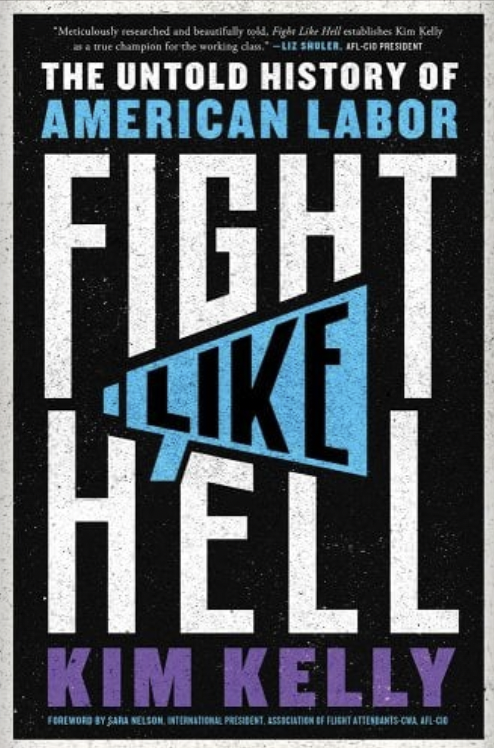
Kim Kelly, Fight Like Hell: The Untold History of American Labor
It feels like history—the teaching of it, the value of it—is on the back foot these days in an America that would rather ban a book than read it. Which is why I’m grateful for labor journalist Kim Kelly’s full-length history of American labor, Fight Like Hell. It has always been a little too easy to take for granted the sacrifices of previous generations, but when those sacrifices—which have given us such basic rights as a minimum wage, an eight-hour work day, and a five-day work week—are actively disappeared by an establishment that fears the power of collective action, steps must be taken! From epic clashes like the Battle of Blair Mountain to the lesser known but just as crucial struggles of farm laborers and garment workers, the stories in Fight Like Hell remind us again and again that change is possible… if only we stick together. –JD
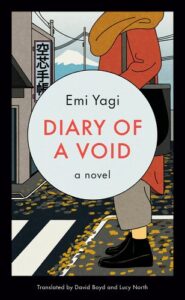
Emi Yagi, tr. David Boyd and Lucy North, Diary of a Void
The story of this debut novel is deceptively simple: a woman, sick of being treated like shit at her office job, pretends to be pregnant. Suddenly, her colleagues treat her well, provide accommodations, and her work life improves, even becomes enjoyable. She doesn’t have to clean up after her coworkers or work overtime, and instead spends her free time watching TV and going to an aerobics class for expectant mothers. Diary of a Void is more than a workplace novel; it’s a surreal and critical look at fertility, motherhood, and the roles women are forced to play for the convenience of men. –EF
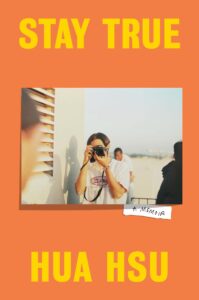
Hua Hsu, Stay True
Memoir is not my favorite genre, so I’m always pleasantly surprised when I read one that finds its way under my skin. Stay True is the rare memoir that felt—to borrow a word from every blurb ever—urgent. It’s a quiet book, and intensely personal. Hsu doesn’t grasp toward the universal, but the universal is there nevertheless. The book tells the story of his college years, and his friendship with the easygoing, affable Ken, whose life is cut short by a random act of violence. Hsu writes about grief and nostalgia, youth and identity, family and friendship, with elegant, heartbreaking clarity. Hsu renders precisely the vast expanses of time that defined youth—car rides, browsing at record stores, collaging together an identity from loves and hates. Stay True is a book whose subtlety renders its emotional wallop all the more powerful. –JG

Jennifer Egan, The Candy House
I’m always astounded by the breadth and depth of Egan’s imagination, not to mention her ability to surprise, delight, and entertain at every turn. The Candy House is a “sibling novel” to her Pulitzer Prize-winning 2011 novel A Visit From the Goon Squad, and it is almost as good, which is saying quite a lot. Like its sister, it cycles through perspectives and styles to weave a baroque tapestry of human connection and speculative world-building, and like its predecessor, it somehow manages to be even more than the sum of its (already very good!) parts. –ET
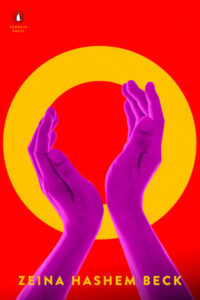
Zeina Hashem Beck, O
Zeina Hashem Beck’s O was my favorite new book of poetry published this year. Together, the poems read like a dialogue between a single person and the divine: awe-inspiring, infuriating, and filled with unanswerable questions. The word that comes to mind to describe this collection, more than any other, is abundance: from odes to ghazals, Arabic to English, Beck calls upon a multitude of traditions to meet the challenge of navigating a life in language, and the result is something very beautiful to witness. –CS
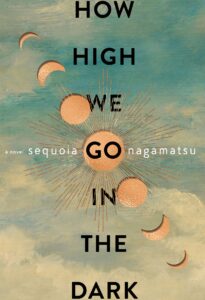
Sequoia Nagamatsu, How High We Go In the Dark
Sequoia Nagamatsu’s novel is without a doubt one of the darkest, most mind-blowingly inventive books I’ve read in a very long time. Consider yourself warned, though: it is not for the faint of heart. It starts in the year 2030, when a retired archeologist voyages to the Arctic Circle—to the site of his daughter’s last expedition before she died. Researchers are studying the preserved body of a girl who died of an ancient virus—a virus that is unleashed from the permafrost as it melts. And that’s just the first section! From there, we are dropped into different lives and different timelines, to see the varying effects of the Arctic plague. There’s an amusement park for dying children. There’s even a stint in a purgatory-like space.
I know I’ve made it all sound terribly depressing, but Sequoia Nagamatsu does an incredible job of infusing so many moments of levity in here, too. A lot of the joy in reading this novel comes from all the Easter eggs he leaves throughout: a side character in one section will reappear as the star of another. It’s so much fun to follow the web. For all the darkness he writes, there is also so much light. And, hey, if you take this recommendation and need someone to talk to after the pig section (you’ll know), I’m here for you, friend. –KY
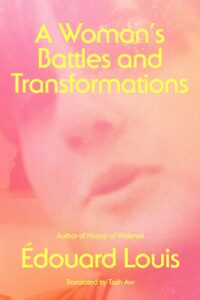
Édouard Louis, tr. Tash Aw, A Woman’s Battles and Transformations
At 30 years old, Édouard Louis has already written five best-selling novels in France; A Woman’s Battles and Transformations is his fourth. Known for his autobiographical writing on queerness, poverty, masculinity, and sexual violence, Louis writes here about his mother, Monique; her struggles to support Louis and his four siblings (one’s stomach sinks when learning she’s pregnant with twins); and her eventual escape from her abusive husband, Louis’s father. There’s a fairy tale quality to it all—we meet Monique as she’s leaving her marriage—but also a deeply vulnerable reckoning of a son’s evolving feelings toward his mother (solidarity, pity, shame, pride) and the loneliness of class transition as Louis leaves his working-class village behind for university and a writing career. A stunning addition to a remarkable oeuvre. –ES
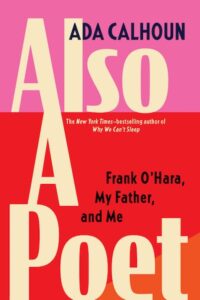
Ada Calhoun, Also a Poet: Frank O’Hara, My Father, and Me
One day, quite by accident, the late art critic Peter Schjeldahl’s daughter Ada Calhoun comes across recordings of her father interviewing Frank O’Hara’s colleagues—cassettes he made as he prepared to write an authorized biography of the poet in the late 1970s. But as support was withdrawn by O’Hara’s sister and literary executor, the project was never finished. Calhoun believes she can resurrect the work, but in this woven memoir-biography-familial history, she does much more than that. While Calhoun connects with her father through their mutual adoration of O’Hara, it’s after Schjeldahl’s lung cancer diagnosis that the book shifts to examine, and understand, the relationship between father and daughter most clearly: “Maybe what I’m figuring out is that the book I was meant to write was never a book about O’Hara—or even really about my father. It was about me.” The honesty of a memoir and the scholarship of a history, this is a beautiful book in what feels like a brand new genre. –EF

Mary Childs, The Bond King
Before I read Mary Childs’ gripping account of the rise of the bond market—and its erstwhile king, Bill Gross—I knew almost nothing about the shadowy world of finance, besides that it was quietly ruining the lives of anyone who isn’t already extremely rich. Childs did nothing to dispel the latter conviction, but she did help me understand much more about how the shadowy world functions, and about the people (okay, men) who keep it lumbering on. This is an essential and enraging book, and it’s also a page-turner, even if you have a literary website editor’s knowledge of the financial world. It’s also very funny, from the incredibly petty corrections from one of Childs’ subject’s attorneys (“‘Dr. El-Erian placed an order [for cake] consistent with the bakery’s operating hours,’ his lawyer says.”) to the tales of billionaire divorce hijinks (which, I’m sorry to say, include the use of joke store fart spray).
The Bond King reminded me of the time in 2008 when we all decided it would be a good idea to be aware of what those money guys were doing, and then largely forgot. Unfortunately, they’re still doing the bad stuff! Luckily, this book makes it easier to pay attention. –JG
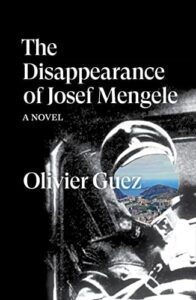
Olivier Guez, tr. Georgia de Chamberet, The Disappearance of Josef Mengele
As Olivier Guez’s brilliant historical novel begins, the despicable doctor Mengele is living in Argentina, where he’s been welcomed by Peròn, who keeps a contingent of Nazis close by and has allowed in many of the worst war criminals of history into his nation. Mengele finds success in his new home and respect from his equally horrible peers, and spends the first 15 years or so sleeping with escorts, selling his father’s farm equipment, and giving the daughters of the elite illegal abortions on the side. After the capture of Eichman, Mengele becomes obsessed with the specter of Israeli pursuit, yet Guez does a wonderful job at capturing the mindset of a hunted Nazi who’s still utterly convinced that he’s done nothing wrong, despite the occasional nightmare in his sleep that says otherwise.
Most have made Mengele into a complete monster, but Guez does something much more interesting: he takes the monster and shows him as pathetic, disgusting, declining, and weak—exactly as Nazis and their ilk should be portrayed. When you depict someone as classically monstrous, you risk inspiring others to follow in their footsteps for the notoriety alone, but when you find the most squabbling, pathetic, petty parts of a villain to highlight, you can perhaps help to ensure that no one will seek to emulate them. –MO
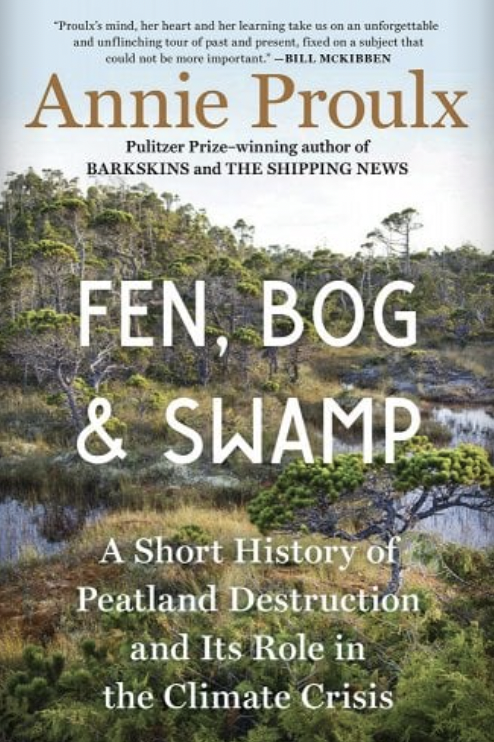
Annie Proulx, Fen, Bog, and Swamp: A Short History of Peatland Destruction and Its Role in the Climate Crisis
The cascading ecological tragedies we’ve wrought upon the planet through human-created climate change can seem too numerous to contemplate. Taken as a whole, it is truly overwhelming. Though no less tragic, what Annie Proulx has done with Fen, Bog, and Swamp is to make it local, fixing her brilliant eye for nature on a very specific kind of ecosystem, one whose decline has been hastened by climate change, but is simultaneously contributing to it: the unglamorous wetland. From the mysterious fenlands of eastern England to Russia’s Great Vasyugan Mire, Proulx has written both a lamentation for what was and a moral call to action to preserve what might yet be. –JD
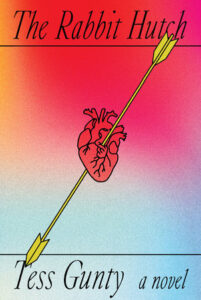
Tess Gunty, The Rabbit Hutch
Tess Gunty’s brilliant, startling debut The Rabbit Hutch was the well-deserved winner of the National Book Award. Magnetic and compelling from the first line: On a hot night in apartment C4, Blandine Watkins exits her body, Gunty delivers on the high bar she sets. She paints the scene, then traces back in time everything that leads up to that “hot night”, and the hard, horrible thing that happens there. We can feel the darkness seeping through the book, though we’re not sure exactly where to look, for whom to feel fear. But we come to know, and love, Blandine Watkins, an 18-year-old girl who lived through the foster care system and now lives with three other boys from the same situation. We can feel her vast intellect, her longing for life to be deep and meaningful, and the strength she possesses to have made it through the hardships of her life.
But the world continues to do Blandine wrong: we watch as she falls for her drama teacher in high school, how he reciprocates, leads her on, sleeps with her, abandons her. Gunty manages to make this old phenomenon new again in her perfect, spot-on prose, and gracefully makes clear how this affair sets many other events in motion: Blandine drops out of school, changes her name, becomes obsessed with the mystic Hildegard, wishes to leave this plane of existence, and all of this, inevitably, leads up to: on a hot night in apartment C4, Blandine Watkins exits her body. –JH
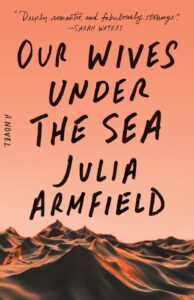
Julia Armfield, Our Wives Under the Sea
I have no idea how to classify this eerie and wonderful novel. Is it a tender love story? Certainly. Is it a creeping gothic body horror? Yes. Is it a low-key speculative conspiracy tale? In part. Is it an aquatic allegory for the pain of realizing your long-term partner is slipping away from you? Maybe? Armfield’s debut novel follows Miri and Leah, a young couple cocooning at home after Leah’s return from a routine submarine expedition that went horribly wrong. Lost in her thoughts, Leah runs the taps, lingers for hours in the bath, doesn’t eat, drinks glasses of salt water… Between these chapters—where Miri tries desperately to understand what’s happening to her love—are increasingly suspenseful dispatches from Leah’s stint at the bottom of the ocean. It’s a strange, sad, funny, ethereal book. Its final act is achingly beautiful and utterly terrifying. I still don’t quite know what to make of Our Wives Under the Sea, but I can’t stop thinking about it. –DS
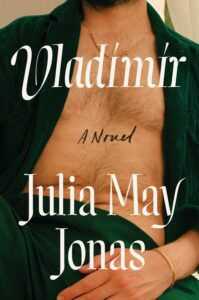
Julia May Jonas, Vladimir
The protagonist of Julia May Jonas’s debut novel is smart, acerbic, and absolutely fed up. A professor at a small college in upstate New York, she’s having a rough time: her husband John, chair of the English department, is awaiting disciplinary action for having had dalliances with students over the course of his career. While our narrator was well aware of her husband’s affairs (they had an agreement), the sidelong glances from her students and other faculty members, as well as her own daughter, are getting to her. In walks a new junior professor of literature: the young, hot novelist Vladimir Vladinski—a perfect distraction, soon-to-be obsession. The narrating voice is wonderfully crass, honest about sexuality and desire and aging and the stresses of female identity, parenthood, and being a wife. The throttle to the climax (ahem) leads to a more than shocking conclusion, but it’s all held together by the voice, which is utterly compelling. –EF
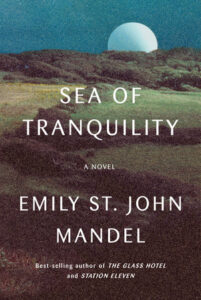
Emily St. John Mandel, Sea of Tranquility
Weirder and cooler (in the tonal sense) than Station Eleven, looser in concept than The Glass Hotel, but containing many tendrils of connection to both, Sea of Tranquility is a gorgeous, elegiac novel about time travel, art, plague, and (yes) the moon. Mandel is a painterly writer, and certain scenes of this novel have been plastered into my brain forever—a not entirely unwelcome feeling, though considering the subjects, sometimes an unsettling one. –ET
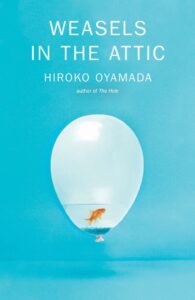
Hiroko Oyamada, tr. David Boyd, Weasels in the Attic
Hiroko Oyamada’s latest novel—coming on the heels of The Factory and The Hole—is a wonder of narrative economy and quiet suspense. At under 100 pages, it’s easy to tear through in a single sitting, but its taut, unsettling scenes will stay with you long after you put it aside. The novel follows its narrator and his friend across three dinners, several years apart, each of which plays out in the spaces between real and surreal, quotidian and terrifying. Oyamada explores marriage, fertility, and the tensions of domesticity with tension, unexpected humor, and just enough revulsion. This is a tiny, cocked fist of a book that will make you think twice before tapping the glass of a fish tank. –JG
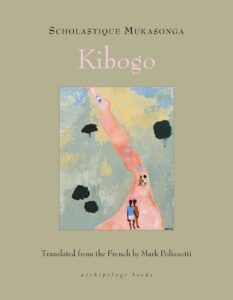
Scholastique Mukasonga, tr. Mark Polizzotti, Kibogo
Scholastique Mukasonga’s stunning Kibogo—translated by Mark Polizzotti and a finalist for the National Book Award this year—has at its center a story told among a Rwandan community and long hidden from their colonial Belgian occupiers: that of Kibogo, who sacrificed his life so that rain would return to his community, and Mukamwezi, his isolated, still-living widow. In the midst of famine, this central story becomes a lens, a guide, and a spiritual center, powered by the strength of community memory and imagination. Mukasonga’s writing is lyrical, powerful, and so rewarding; this story is unforgettable. –CS
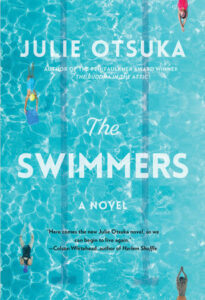
Julie Otsuka, The Swimmers
The Swimmers opens onto a community pool. We get to know its regulars, their routines, their tenuous relationships to one another. We are let in on their rules, both written and unspoken. We come to understand that this is a place of utopia for them. (The first section is told in the collective “we,” a hallmark of Julie Otsuka’s writing, an invitation in.) One day, a mysterious crack appears at the bottom of the pool like a bad omen. Our swimmers speculate wildly about what it is, what it means. When the pool is shut down, we zero in on Alice, an elderly woman who is losing her memory. Without the sanctuary and dependable schedule that the pool provided, dementia settles in and childhood memories of her time in the Japanese incarceration camps resurface. When her daughter comes to intervene, Alice is taken to a care facility, and the narration shifts to embody the creepy, all-knowing, “well-intentioned” voice of corporate homes for the elderly. In the last section, it switches again—to address the “you” that is the daughter, struggling with her mother’s demise. As always with Julie Otsuka’s writing, it’s such exquisite pleasure to let the cadence of her sentences wash over you.
Her previous novels (The Buddha in the Attic and When the Emperor Was Divine) tackle similar subject matter: the tragedy of Japanese internment and the way we talk about it (or don’t talk about it), the way the trauma takes shape in future generations. Not only is The Swimmers important in its own right, but it’s also the perfect addition to her oeuvre. It’s Julie Otsuka’s first novel in over a decade, and it was well worth the wait. And now what? We’ll read and return to her other works. We’ll press them into the hands of our friends. We’ll happily sit for another ten years in eager anticipation of the next one. –KY
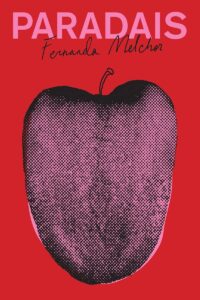
Fernanda Melchor, tr. Sophie Hughes, Paradais
Fernanda Melchor’s Paradais is brutal poetry, distilled. It’s also a visceral examination of classism, fatphobia, and most of all misogyny. In a luxury apartment complex, two boys on the cusp of manhood while away a long summer drinking together. Franco Andrade, a resident of the complex who lives with his grandparents but is ostracized by the rest of the community, is overweight, undersocialized, and sexually obsessed with his neighbor; he steals liquor from his family and shares it with Polo, the teenage gardener of the complex, who yearns to join the cartels and make something of himself instead of wasting his youth trimming grass for rich people. Franco has a fantasy that becomes more and more like a plan: he’s going to break into his neighbor’s home and force himself on the object of his desires. Polo’s pissed off, drunk, and just angry enough to help Franco out. Like other works out this summer, including Liska Jacobs’ brilliant The Pink Hotel, Paradais warns against considering any luxurious abode as “safe” when the mere existence of such enclaves intensifies the inequalities that will eventually lead to their own demise. –MO

Dwyer Murphy, An Honest Living
A rain-spattered love letter to a bygone New York, a wry homage to a classic of the genre, and a delightfully meta work of neo-noir, Dwyer Murphy’s brilliantly assured debut is the story of an unwitting attorney-turned-private investigator who gets tangled up in a crime of obsession between a reclusive author and her antiquarian bookseller husband. The mystery is beautifully constructed, the writing crackles on every page, and Murphy’s portrait of early 2000s New York City is nothing short of exquisite. If you’re looking to lose yourself inside a smart, atmospheric literary crime novel this winter, An Honest Living will not disappoint. [Murphy is an editor at CrimeReads, a sister site of Lit Hub’s] –DS
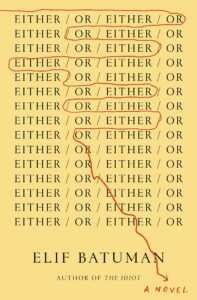
Elif Batuman, Either/Or
In the sequel to The Idiot, we’re reunited with Selin as she embarks on her sophomore year at Harvard, and she is the same as ever, though changed, minutely, hugely, in the year she’s experienced. I could eat Selin’s voice with a spoon: she is hilarious, and self-effacing, and so so smart, and interested in how to be, totally preoccupied with reading and talking about life, and yet not sure at all how to put it into practice. It’s an awe-inspiring ability Batuman has, writing convincingly as a 19-year-old girl experiencing many things for the first time. Notably, Selin’s sexual self comes alive in this book, or at least her curiosity does, as she convinces herself that to live “a full life”, sex is something she needs to experience. She sets out on this project, and we witness her approach this side of life just as she approaches anything: with interest, humor, gameness, and an attempt to merge reality with how she thought it would be. Clocking in around 800 pages, Batuman creates an epic of a young girl’s journey to becoming, and an epic it is. It’s momentous, impossibly perceptive, with an addictive, contagious outlook on the world; it could be double its length and still I’d want more. –JH
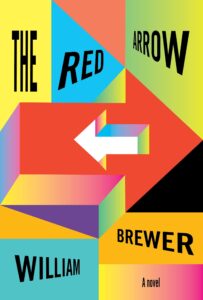
William Brewer, The Red Arrow
The Red Arrow could offer a masterclass in its depiction of the movement of time, how it reaches into the past and the future, then flickers back to the present with such ease, somehow linear in its nonlinearity. There’s something welcomingly Ben Lerner-esque in its smooth, conversational tone, as the narrator tells of all that has happened to him, whether far-fetched or commonplace. It’s a story of lowest lows, worst fears coming true, as well as nearly unbelievable peace and happiness. I say nearly unbelievable, because The Red Arrow toes the line of surreality with the grace of a tightrope walker, using a few choice words, such as “The Mist” and “The Treatment” that point to the vaguely supernatural, though when depicted, we find them to be recognizably human experiences: “The Mist” is the narrator’s crippling depression, and “The Treatment” is a psychedelic therapy that manages to fundamentally alter his brain’s tendency towards severe misery and suicidal ideation. This is the most important arc of the novel, and yet so much else happens: book deals, defaulting on a contract with a publisher, a marriage, the death of a friend, a journey to Italy, plot-heavy in the way that life can be plot-heavy, so much happens, but what matters most is this: for part of his life, the narrator wished to die. After his treatment, he no longer wishes to. How can anything be as important as that?
The Red Arrow feels close to home for William Brewer, it feels purposeful and a directive in the most graceful sense of that word: a reminder that suffering is not the key to art and creation, but a narrowing, a blocking off of the best parts of being alive. To receive such a message from such a compulsively readable, deliciously heady novel is even more striking; The Red Arrow manages to flawlessly merge earnestness and self-awareness, and avoids any pitfalls of a recovery novel. This is not “a book about depression” but a totally life-affirming, exhilarating rush through time and place and conversations and thoughts that will leave you winded and thrilled for Brewer for writing it, and for yourself for getting to experience it. –JH
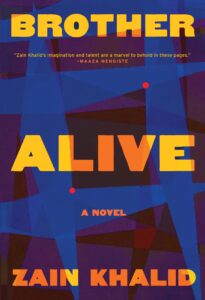
Zain Khalid, Brother Alive
Brother Alive is a rich kaleidoscope of a novel. On the one hand, it is a family epic about three adopted brothers living above a mosque in New York: Dayo, Iseul, and Youssef (our guide). Their guardian, Imam Salim, wants so badly for them to be successful in life, but the secrets of his past force him to keep them at a distance. Still, there is so much warmth in these pages: the banter between the brothers, their love and their annoyance, their faithful obligation to one another are expertly rendered. There is one other very important figure worth mentioning: the eponymous Brother, sort of an imaginary friend that accompanies our narrator throughout his life. (Of Brother, he says, “When we acquire language, we are each other’s first word.”) What is Brother? A sign of madness? A family inheritance? A kind of ghost? He takes the shape of various creatures, and he feeds off memories and literature. In this sense, Brother Alive is also a love letter to language, but the book shapeshifts as much as this mysterious Brother character.
Brother Alive is also a queer love story. Turn the lens again, and it is a rewarding adventure through the streets of Staten Island and Saudi Arabia. Or: it’s an indictment against institutions that exert their control. It’s all woven together under the steady assurance of Zain Khalid’s thoughtful, gorgeous sentences. And the truth about Brother is more sinister than you can imagine. You’ll find yourself turning pages to get to the bottom of this intrigue, but you’ll happily get lost in this rewarding maze. –KY
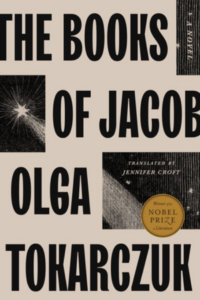
Olga Togarczuk, tr. Jennifer Croft, The Books of Jacob
This might be the most important book about Jewish stories written by a gentile since Nathan the Wise—it’s refreshing to think that Polish readers are so interested in exploring the complexities of their history (although there was considerable backlash against this book in Polish nationalist circles when it was first published in 2015). The Books of Jacob concerns itself with the life and legend of self-proclaimed messiah Jacob Frank, who started a splinter religion and sex cult in the 18th century with destabilizing ripple effects across the Polish-Lithuanian commonwealth.
The novel is an appropriate length for the staggering level of understanding Togarczuk brings to the strangeness of the past; here there are no modernist ideals thrown dizzy-tizzy into character perspectives to make them more relatable, but instead an authentic attempt to get into the multifaceted mindsets of a tumultuous century. If you care about honoring the past (or if you just want to read about a truly bizarre sex cult), I promise the 900+ pages of this novel will, like the messianic cult contained within its pages, be gone faster than you’d think. Also if you finish reading this and think hey, I want another 1000 page historical novel about Jews from a goy, check out Captivity by György Spiró! –MO
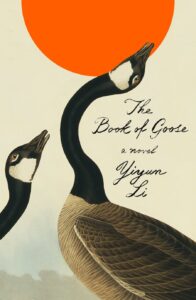
Yiyun Li, The Book of Goose
Reader, I wish you the experience of losing yourself in Yiyun Li’s latest novel over a weekend, like I did. The Book of Goose tells the story of Fabienne and Agnès, two girls with dim futures growing up in postwar rural France (yes, there are notes of the Neapolitan Novels throughout, though I hesitate to draw the comparison because this book deserves to stand on its own). When Fabienne proposes that they write a book together—or rather, that Fabienne dictate a book to Agnès, who will in turn give the book her name—their life trajectories are decisively fractured, with Agnès rising to literary fame and being sent away to finishing school, longing only to be reunited with Fabienne, whose correspondence grows increasingly enigmatic. Li brilliantly captures the cruelties and loyalties of friendship, the brutalities of class, the anxieties of authorship, and the absurdities of celebrity in this dream of a book. –ES
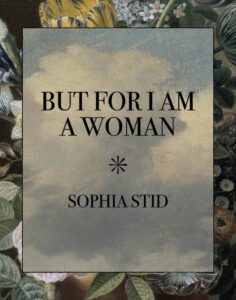
Sophia Stid, But For I Am a Woman
But For I Am a Woman is a poetry chapbook that revolves around Julian of Norwich (b. 1342), an anchorite and mystic who is the first woman known to have written a book in the English language. An anchorite (in case you heathens don’t know) was someone who voluntarily lived in seclusion for religious purposes; Julian of Norwich was sealed within her home as she watched the bricks being laid, and was declared effectively dead. Taking a room of one’s own to another level, Julian of Norwich thought, communed with God, and wrote, never to leave the four walls she vowed to remain in for the rest of her days.
Sophia Stid has written a remarkable exploration of Julian’s life as a woman and writer in those days, interspersing the voice of a contemporary speaker with the stories of Julian: Julian is she and the speaker is I. The book is filled with too many exquisite lines to count that stopped me in my tracks, but the true success is the work as a whole, the excavation of grief, womanhood, isolation, and freedom across time and difference. The speaker learns from Julian, takes what she can use, and then chooses her own path to freedom:
I believed
dying was what made a saint. And I knew
I was supposed to want that, to lie still
and wait to be made. But I didn’t want to die.
I read the book to learn how I could live—
–JH
Emily Temple
Emily Temple is the managing editor at Lit Hub. Her first novel, The Lightness, was published by William Morrow/HarperCollins in June 2020. You can buy it here.












